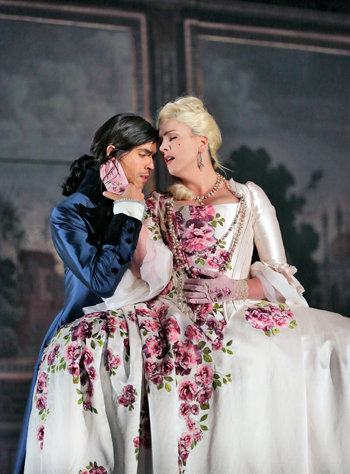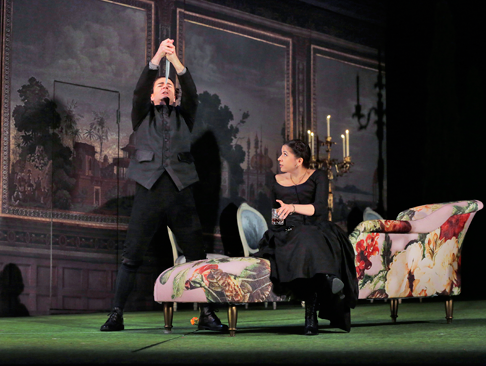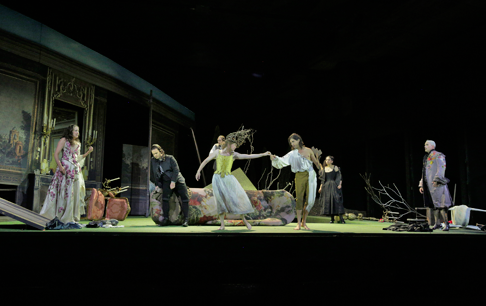![Heidi Stober as Sandrina and William Burden as the Podesta [Photo by Ken Howard]](http://www.operatoday.com/6-Heidi-Stober-%28Sandrina%29-and-William-Burden-%28Podesta%29-in-%E2%80%98La-Finta-Giardiniera.%E2%80%99-Photo-%C2%A9-Ken-Howard-for-Santa-Fe-Opera%2C-2015.png)
30 Aug 2015
Santa Fe: Secondary Mozart in First Rate Staging
Impresario Boris Goldovsky famously referred to La finta giardiniera as The Phony Farmerette.
English Touring Opera are delighted to announce a season of lyric monodramas to tour nationally from October to December. The season features music for solo singer and piano by Argento, Britten, Tippett and Shostakovich with a bold and inventive approach to making opera during social distancing.
This tenth of ten Live from London concerts was in fact a recorded live performance from California. It was no less enjoyable for that, and it was also uplifting to learn that this wasn’t in fact the ‘last’ LfL event that we will be able to enjoy, courtesy of VOCES8 and their fellow vocal ensembles (more below …).
Ever since Wigmore Hall announced their superb series of autumn concerts, all streamed live and available free of charge, I’d been looking forward to this song recital by Ian Bostridge and Imogen Cooper.
Although Stile Antico’s programme article for their Live from London recital introduced their selection from the many treasures of the English Renaissance in the context of the theological debates and upheavals of the Tudor and Elizabethan years, their performance was more evocative of private chamber music than of public liturgy.
Evidently, face masks don’t stifle appreciative “Bravo!”s. And, reducing audience numbers doesn’t lower the volume of such acclamations. For, the audience at Wigmore Hall gave soprano Elizabeth Llewellyn and pianist Simon Lepper a greatly deserved warm reception and hearty response following this lunchtime recital of late-Romantic song.
For this week’s Live from London vocal recital we moved from the home of VOCES8, St Anne and St Agnes in the City of London, to Kings Place, where The Sixteen - who have been associate artists at the venue for some time - presented a programme of music and words bound together by the theme of ‘reflection’.
'Such is your divine Disposation that both you excellently understand, and royally entertaine the Exercise of Musicke.’
‘And there was war in heaven: Michael and his angels fought against the dragon; and the dragon fought and his angels, And prevailed not; neither was their place found any more in heaven … that old serpent … Satan, which deceiveth the whole world: he was cast out into the earth, and his angels were cast out with him.’
There was never any doubt that the fifth of the twelve Met Stars Live in Concert broadcasts was going to be a palpably intense and vivid event, as well as a musically stunning and theatrically enervating experience.
‘Love’ was the theme for this Live from London performance by Apollo5. Given the complexity and diversity of that human emotion, and Apollo5’s reputation for versatility and diverse repertoire, ranging from Renaissance choral music to jazz, from contemporary classical works to popular song, it was no surprise that their programme spanned 500 years and several musical styles.
The Academy of St Martin in the Fields have titled their autumn series of eight concerts - which are taking place at 5pm and 7.30pm on two Saturdays each month at their home venue in Trafalgar Square, and being filmed for streaming the following Thursday - ‘re:connect’.
The London Symphony Orchestra opened their Autumn 2020 season with a homage to Oliver Knussen, who died at the age of 66 in July 2018. The programme traced a national musical lineage through the twentieth century, from Britten to Knussen, on to Mark-Anthony Turnage, and entwining the LSO and Rattle too.
With the Live from London digital vocal festival entering the second half of the series, the festival’s host, VOCES8, returned to their home at St Annes and St Agnes in the City of London to present a sequence of ‘Choral Dances’ - vocal music inspired by dance, embracing diverse genres from the Renaissance madrigal to swing jazz.
Just a few unison string wriggles from the opening of Mozart’s overture to Le nozze di Figaro are enough to make any opera-lover perch on the edge of their seat, in excited anticipation of the drama in music to come, so there could be no other curtain-raiser for this Gala Concert at the Royal Opera House, the latest instalment from ‘their House’ to ‘our houses’.
"Before the ending of the day, creator of all things, we pray that, with your accustomed mercy, you may watch over us."
The doors at The Metropolitan Opera will not open to live audiences until 2021 at the earliest, and the likelihood of normal operatic life resuming in cities around the world looks but a distant dream at present. But, while we may not be invited from our homes into the opera house for some time yet, with its free daily screenings of past productions and its pay-per-view Met Stars Live in Concert series, the Met continues to bring opera into our homes.
Music-making at this year’s Grange Festival Opera may have fallen silent in June and July, but the country house and extensive grounds of The Grange provided an ideal setting for a weekend of twelve specially conceived ‘promenade’ performances encompassing music and dance.
There’s a “slide of harmony” and “all the bones leave your body at that moment and you collapse to the floor, it’s so extraordinary.”
“Music for a while, shall all your cares beguile.”
The hum of bees rising from myriad scented blooms; gentle strains of birdsong; the cheerful chatter of picnickers beside a still lake; decorous thwacks of leather on willow; song and music floating through the warm evening air.
![Heidi Stober as Sandrina and William Burden as the Podesta [Photo by Ken Howard]](http://www.operatoday.com/6-Heidi-Stober-%28Sandrina%29-and-William-Burden-%28Podesta%29-in-%E2%80%98La-Finta-Giardiniera.%E2%80%99-Photo-%C2%A9-Ken-Howard-for-Santa-Fe-Opera%2C-2015.png)
Impresario Boris Goldovsky famously referred to La finta giardiniera as The Phony Farmerette.
Assuredly, there was nothing phony about Santa Fe Opera’s total commitment to quality in producing this lesser Mozart opus. There is nothing really wrong with the writing to be sure, but neither is there the brilliance of his masterpieces yet to come. Still, second tier Mozart is arguably better than first rate Soler, or Salieri.
The production itself could hardly have been bettered, however, and if this meticulously performed Finta didn’t stir you, it probably never will. This was stagecraft and music making as good as it gets. The starry cast was under the inspired baton of conductor Harry Bicket.
Maestro Bicket is celebrated for his especial skills in this type of repertoire and he led a vivid, urgent reading of great variety and color. His attention to detail drew committed playing from the exceptional orchestra, and impassioned, heartfelt vocalizing from his singers.
William Burden is one of the finest lyric tenors in the business, and one of the busiest. I know of no one else who can survey such a wide range of roles from Baroque to Contemporary with such assurance. As the Podestà (Magistrate), Mr. Burden has ample opportunity to show his full bag of tricks which includes honeyed tone, supple technique, and dead accurate melismas. A consummate actor, he always, always sings with utter conviction and understanding of the drama. This was but another outstanding portrayal from this treasurable tenor.
 Susanna Phillips as Arminda and Joel Prieto as Count Belfiore
Susanna Phillips as Arminda and Joel Prieto as Count Belfiore
I first encountered soprano Heidi Stober at Opera Theatre of Saint Louis where I thought she was remarkably fine. In the intervening years, Ms. Stober has grown even more and on this occasion, her Sandrina was individualized, poignant, musically faultless, and fully realized as a wonderfully complex character. She did not sing the part so much as inhabit it. Her poised, warm instrument had enormous appeal.
Providing welcome balance, Laura Tatulescu combined sass and pointed singing to create an edgy, confrontational impression as the sharp-tongued Serpetta. It is to her credit and skillful technique that Ms. Tatulescu is able to craft a personality that is acerbic, without the vocals turning acidic. Her clear, rhythmically assured singing was a pleasure and she clearly relished her comic opportunities and wrung every bit of firebrand potential out of the role.
Joshua Hopkins is a suave performer, with a rich, manly baritone, evenly produced with a suggestion of plush velvet. His Nardo was a perfect foil for Serpetta and they created real sparks between them. Mr. Hopkins knows how to command the stage and his physical presence was as handsome as his vocalizing. Cecelia Hall effected just the right hangdog look to engage our sympathies as Ramiro, and her creamy singing was vibrant and characterful. Even in such a less developed role, Ms. Hall more than held her own in this polished ensemble.
Susanna Phillips took obvious delight in playing Arminda, the opera’s Queen of Mean. She found ample excuses to unleash pointed phrases styled with laser-like accuracy. Yet she resisted delving into caricature, and she also lavished us with singing of amplitude and richness. Ms. Phillips’ disciplined vocal portrayal was nevertheless wedded to a sense of spontaneity thanks to her canny acting.
 Joshua Hopkins as Nardo and Laura Tatulescu as Serpetta
Joshua Hopkins as Nardo and Laura Tatulescu as Serpetta
Rounding out that cast as Count Belfiore, Joel Prieto offered witty, fluid phrases that were well served by his congenial tenor. Mr. Prieto, too, had a good sense of fun and a loose, easy stage presence. His flexible technique and appealing bright timbre suited the role, although there may be more to be mined in the complicated Count.
Tim Albery has directed with simplicity and clarity. His fluid movement of the actors was highly effective, and the shifting pairings-up, and squarings-off of the cast were brilliant. The whole evening played out as a balletic cat and mouse game with roles, and advantage of positions, in constant flux.
Hildegard Bechler has certainly done her part to ensure the evening’s success with a set design that is at once functional, mysterious, bare bones, and profound. There is an arching wall stage left that is impeccably detailed with an ornate tromp l’oeil recreation of a period palace hall. Chairs with upholstered seats stand against the wall, while a large dining room table sits center stage. This functions as occasional meeting place where character some together, or as a barrier, keeping characters apart.
About two thirds of the stage is covered with lush green Astroturf-as-carpeting, abutted by the requisite garden which takes up the down left area. The rust and yellow flowers (many planted by Sandrina in Act One) are a beautiful balance as they encroach on the formal interior. The dining table is replaced in Act Two by a chaise lounge, which got cleverly incorporated into the staging.
 The ensemble
The ensemble
Jon Morrell created totally apt costumes that aided greatly in the characterizations, black and severe for the servants (including the phony farmerette), and sumptuous for the nobles. The incorporation of floral images in such things as Arminda’s dress and the tablecloth only added to the cheeky visuals. Thomas C. Hase’s slowly unfolding lighting effects were mesmerizing. The extremely deliberate cross fade from sunny exterior to moody interior in the first act was stunning.
Every element of La finta giardiniera was committed to showing that this talented group absolutely believed in the worth of this piece. And damn, if ultimately they didn’t succeed in making me believe in it, too!
James Sohre
Cast and production information:
Sandrina: Heidi Stober; Serpetta: Laura Tatulescu; Ramiro: Cecelia Hall; The Podesta: William Burden; Nardo: Joshua Hopkins; Arminda: Susanna Phillips; Count Belfiore: Joel Prieto; Conductor: Harry Bicket; Director: Tim Albery; Set Design: Hildegard Bechler; Costume Design: Jon Morrell; Lighting Design: Thomas C. Hase.